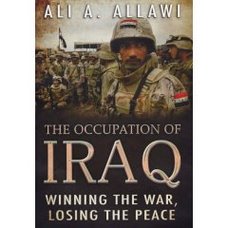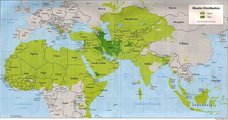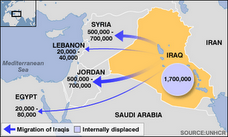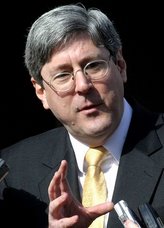READ IT HERE (EXCERPT)
Iraqi society’s growing polarization, the persistent weakness of the security forces and the state in general, and all sides’ ready recourse to violence are collectively driving an increase in communal and insurgent violence and political extremism....even if violence is diminished, given the current winner-take-all attitude and sectarian animosities infecting the political scene, Iraqi leaders will be hard pressed to achieve sustained political reconciliation in the time frame of this estimate. The challenges confronting Iraqis are daunting, and multiple factors are driving the current trajectory of the country’s security and political evolution.
Decades of subordination to Sunni political, social, and economic domination have made the Shia deeply insecure about their hold on power. This insecurity leads the Shia to mistrust U.S. efforts to reconcile Iraqi sects and reinforces their unwillingness to engage with the Sunnis on a variety of issues, including adjusting the structure of Iraq’s federal system, reining in Shia militias, and easing de-Baathification.
Many Sunni Arabs remain unwilling to accept their minority status, believe the central government is illegitimate and incompetent, and are convinced that Shia dominance will increase Iranian influence over Iraq, in ways that erode the state’s Arab character and increase Sunni repression.
The absence of unifying leaders among the Arab Sunni or Shia with the capacity to speak for or exert control over their confessional groups limits prospects for reconciliation. The Kurds remain willing to participate in Iraqi state-building but reluctant to surrender any of the gains in autonomy they have achieved.
The Kurds are moving systematically to increase their control of Kirkuk to guarantee annexation of all or most of the city and province into the Kurdistan Regional Government (K.R.G.) after the constitutionally mandated referendum scheduled to occur no later than 31 December 2007. Arab groups in Kirkuk continue to resist violently what they see as Kurdish encroachment.
Despite real improvements, the Iraqi Security Forces (I.S.F.) — particularly the Iraqi police — will be hard pressed in the next 12-18 months to execute significantly increased security responsibilities, and particularly to operate independently against Shia militias with success. Sectarian divisions erode the dependability of many units, many are hampered by personnel and equipment shortfalls, and a number of Iraqi units have refused to serve outside of the areas where they were recruited.
Extremists — most notably the Sunni jihadist group Al Qaeda in Iraq (A.Q.I.) and Shia oppositionist Jaysh al-Mahdi (J.A.M.) — continue to act as very effective accelerators for what has become a self-sustaining inter-sectarian struggle between Shia and Sunnis.
Significant population displacement, both within Iraq and the movement of Iraqis into neighboring countries, indicates the hardening of ethno-sectarian divisions, diminishes Iraq’s professional and entrepreneurial classes, and strains the capacities of the countries to which they have relocated. The U.N. estimates over a million Iraqis are now in Syria and Jordan.
The Intelligence Community judges that the term “civil war” does not adequately capture the complexity of the conflict in Iraq, which includes extensive Shia-on-Shia violence, Al Qaeda and Sunni insurgent attacks on coalition forces, and widespread criminally motivated violence. Nonetheless, the term “civil war” accurately describes key elements of the Iraqi conflict, including the hardening of ethno-sectarian identities, a sea change in the character of the violence, ethno-sectarian mobilization, and population displacements.
Saturday, February 3, 2007
Subscribe to:
Post Comments (Atom)





No comments:
Post a Comment